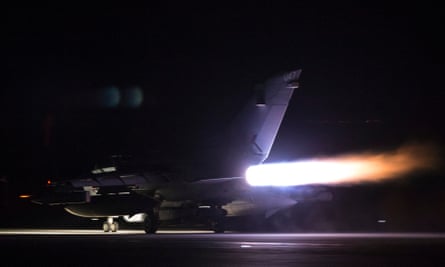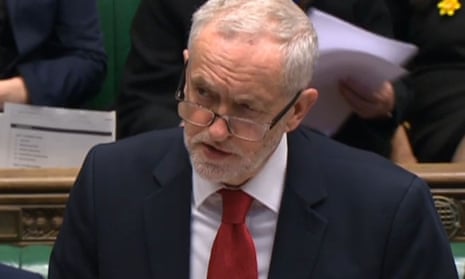Parliament must “take back control” of military matters by passing a law requiring the government to seek MPs’ approval before launching military action overseas, Jeremy Corbyn has argued, though Tory MPs won a symbolic vote on a Labour motion.
Corbyn whipped Labour MPs to oppose the motion, suggesting parliament had been given the chance to scrutinise the UK missile strikes in response to the chemical weapons attack in Douma, Syria.
Introducing a second day of debates afterthe strikes, the Labour leader said Theresa May had shown flagrant disregard for the post-Iraq war convention that parliament should be consulted.
May said she fully supported the principle for major action or a ground offensive, but that to debate the most recent attack in advance would have allowed Syria’s military to prepare missile defences or move the chemical weapons infrastructure targeted.
The debate took place after the Speaker, John Bercow, allowed a Labour motion saying MPs had “considered parliament’s rights in relation to the approval of military action by British forces overseas”.
Labour whips urged the party’s MPs to vote against the motion to indicate they did not believe parliament had been able to fully consider the idea.
However, Conservative MPs turned out to back the motion, and it was passed by 317 votes to 256. The parliamentary gymnastics meant Tory MPs were in the unconventional position of voting for a motion that the leader of the opposition proposed, while Corbyn opposed, but meant Labour were denied the symbolism of MPs implicitly criticising the prime minister’s approach to parliamentary approval of airstrikes.
Introducing the debate, Corbyn said there had been parliamentary votes in recent years over UK involvement in military action in Libya and Syria, including in 2013 when MPs voted against it.
“I’m sorry to say that the prime minister’s decision not to recall parliament, and to engage in further military action in Syria last week, showed a flagrant disregard for this convention,” he said. “It seems the convention established in 2003, and in the cabinet manual, is being tossed aside as simply being inconvenient.”
It was “necessary and urgent” for parliament to discuss its rights and responsibilities, and whether there should be a law compelling ministers to seek advance approval, he said. “It’s for this house to take matters into its own hands and back our control, as some might put it.”
The Chilcot inquiry into the significant intelligence and political failings before the Iraq war should be “a salutary lesson to all of us on the importance of there being total scrutiny of what goes on, and the government being required to come to the house in advance of major decisions”, Corbyn said.

A new law should, as a minimum, let MPs ask ministers in advance of any action that was planned, whether it was necessary and legal, and what it would achieve, he said.
“It’s difficult to argue that requiring governments to answer those questions over matters of life and death would be anything other than a positive step.”
May responded by saying she too agreed MPs “should be able to debate the deployment of British military forces into combat”.
But, she added, that “does not mean it is always appropriate. It therefore cannot and should be not be codified into a parliamentary right to debate every possible overseas mission in advance.
“For as the exception makes clear, there are also situations where coming to parliament in advance would undermine the security of our operations or constrain the ability of our armed forces to act quickly and decisively. In these situations it is right for the prime minister to take the decision and then to be held accountable to parliament for it.”
On the specifics of Saturday’s strike, Syria had “one of most sophisticated air defence systems in the world”, May said. “To counter such a system it is vital to confuse the enemy as much as possible, and to conceal the timing and targets of the planned attack.”
Even to allow questions in advance would have divulged vital information, May said: “All of this would have provided invaluable information that would have put our armed forces at greater risk and greatly increased the likelihood of the regime being able to shoot down our missiles and get their chemical weapons away from our targets.”
Corbyn was backed by the Scottish National party’s Westminster leader, Ian Blackford, who said parliamentary approval should be needed in all but exceptional circumstances.
However, the Tory backbencher Jacob Rees-Mogg argued that while MPs must scrutinise the decision, this could happen retrospectively.
“The executive is being held to account today,” he said. “The prime minister has spent six hours yesterday in this house being held to account, and a further hour today.”








